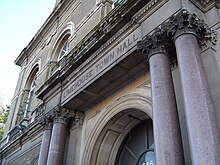Limehouse Town Hall

Limehouse Town Hall is a former town hall building on Commercial Road, in Limehouse, in the London Borough of Tower Hamlets.
History
Limehouse Town Hall was built in 1879-81, designed by A & C Harston, as the vestry hall of the Limehouse District. The building consists of a number of offices, below a 'grand' assembly room, with a suite of former dressing rooms and caretaker's accommodation. In 1900, the civil parish became a part of the Metropolitan Borough of Stepney. In 1965, this in turn, became part of the London Borough of Tower Hamlets, this then became one of a number of surplus town halls — along with Poplar Town Hall and St George's Town Hall.
On 30 July 1909 the Chancellor of the Exchequer David Lloyd George made a polemical speech in the assembly room, attacking the House of Lords for its opposition to his "People's Budget". This speech was the origin of the phrase "To Limehouse", or "Limehousing", which meant an incendiary political speech.[1]
The building has seen a variety of uses since, including serving as the National Museum of Labour History; and a brief return to council administration, as the Wapping Neighbourhood Offices. It was given protection as a Grade II listed building in 1973,[2] but was placed on English Heritage's list of buildings at risk in 2003. In October 2006 the building was given a restoration grant by English Heritage, and is in the process of being renovated as a centre for arts and culture, in particular local history projects.
Current use
The hall currently houses the Limehouse Town Hall Consortium Trust which has a long lease on the building from Tower Hamlets Council, and is home to several groups, such as The Boxing Club (Today this is no longer a boxing club, but a group which hires spaces and arranges occasional events, mostly to raise money for the upkeep of the venue.),[3] Twenteenth Century(disappeared), Primal Pictures, Stitches in Time, the University of Openness, Mute Magazine, Code Positive, Radiance, Equilibrium, Space Hijackers, SQUASH, School of Everything, and Creative Week amongst individual artists. Tower Hamlets Wheelers, the local borough group of London Cycling Campaign, also hold monthly self-help bicycle maintenance workshops at the venue.[4]
The building is not generally open to the public, but participates in Open House London for guided tours of the building.
The building is next to St Anne's Limehouse, a significant Hawksmoor church; and also adjacent to Limehouse Cut, a canal built to provide a short cut from the Lee Navigation to Limehouse Basin.
The nearest Docklands Light Railway station is Limehouse.
References
- ^ Take our word for it 24 Jan 2000 accessed 10 May 2007
- ^ Historic England. "Details from listed building database ({{{num}}})". National Heritage List for England. accessed 13 December 2008
- ^ The Boxing Club
- ^ Bicycle Maintenance Workshop
